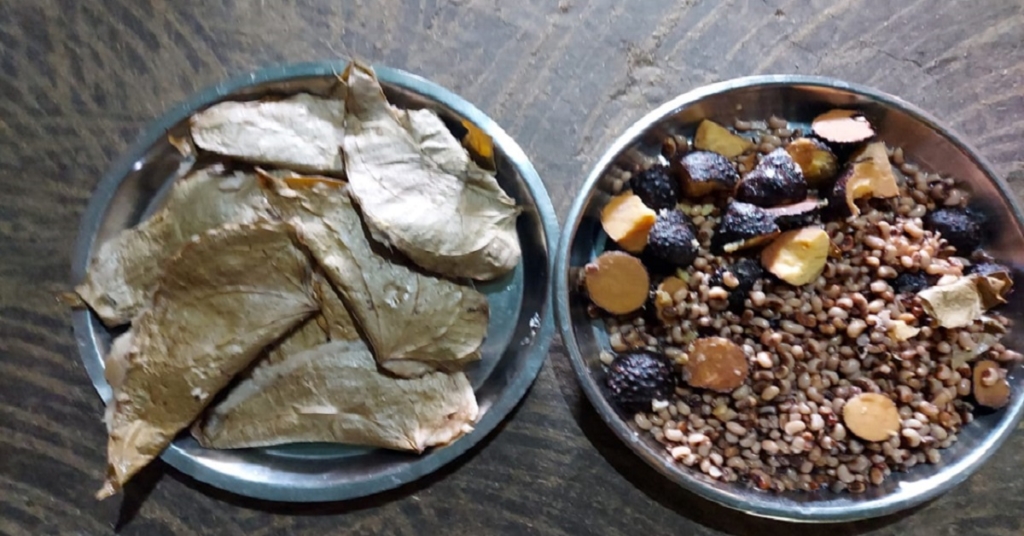Diwali has gone by, but as it is one of the biggest festivals of the tribal community, the sweet taste of the celebrations lingers on. And a perfect way to recall that enthusiasm is to share the history of the foods that are a central part of the celebrations.
The festivities, like farm and forest produce, take their own time to come to fruition. The grains harvested in the hilly terrain from the land and fields obtained from forest rights are stored in a place ‘khala’ before they are taken home.
In the past, grains were threshed properly and stored in granaries made of bamboo which was kept in a corner of the house. The grains kept in the granary were covered with teakwood leaves and cow dung but now people use peepal as an alternative. On Diwali the tribal communities offer these freshly harvested grains to the deities, after which they eat the prasad.
CJP’s Grassroots Fellowship Program is a unique initiative aiming to give voice and agency to the young, from among the communities with whom we work closely. These presently include migrant workers, Dalits, Adivasis and forest workers. CJP Fellows report on issues closest to their hearts and home, and are making impactful change every day. We hope to expand this to include far reaching ethnicities, diverse genders, Muslim artisans, sanitation workers and manual scavengers. Our raison d’etre is to dot India’s vast landscape with the committed human rights workers who carry in their hearts Constitutional values, to transform India into what our nation’s founders dreamt it to be. Please Donate Now to increase the band of CJP Grassroot Fellows.
This year too Diwali was celebrated in every house in my village over four days: Waghbarshi, Chhoti Tivli, Moti Tivli and Balipratipada. The Tiger is worshiped on the day of Waghbarshi. A wooden idol of a tiger is kept in the temple of the village goddess which is situated at the entrance of the village. In my village, there is a stone installed on a hill facing the forest, and it has been worshiped as a symbolic ‘tiger’ for many years. On Diwali day it was worshiped with coconut and incense sticks as an offering.
Balipratipada is a main festival day, when cattle are worshiped at their cowshed. They are decorated with ocher and marigold garlands are out around the neck. Deities made up of rice are worshipped. Abir, Gulal and Marigold flowers are offered to deities. Some images of these traditional offerings may be viewed here:
Potatoes, black-eyed peas are boiled, seasoned with salt, cucumber and jaggery are added to a dough made of rice flour and this mixture is then applied to the chai leaves found in the jungle and steamed. This is called ‘Panmodi’. All this is then offered to the deities along with cooked rice. All the food is later shared as divine prasad. Children go from house to house seeking blessings from the elders.
Tivala is a Diya or oil lamp made from Chibuda, and is lit on Chhoti Tivli and Moti Tivli. Chibuda is a fruit found in the jungle, bitter in taste, green in color and egg-shaped. It is cut horizontally; the inner part is removed and the outer shell used as a diya. From Diwali day, the women also start wearing marigold flowers in their hair, as a mark of the new season that has dawned.
This report is part of CJP’s Grassroots Fellowship Program, and has been written by Mamta Pared who hails from the Warli tribe and lives with her family in Nimbavali village in Palghar district. Here she showcases how life-long poverty and deprivation affect people’s approach to life and livelihood.
Meet Mamta Pared
Mamta Pared is a young Adivasi woman hailing from the Warli community. She lives with her family in Nimbavali village in Palghar district. Her mother is unlettered, while her father was educated up to the fourth standard. After they got married, her parents started working together at a brick kiln. Every year, their family used to migrate for employment and live near brick kilns, six out of twelve months. There are five siblings, the youngest was born when Mamta was five years old. As the eldest daughter in the family, she was responsible for caring for her siblings, and also helped with household chores. She had to skip school frequently and stay home to take care of her brothers. But she studied hard, passed scholarship exams, stayed in a government hostel, even borrowed money to pay college fees. Mamta eventually earned a Bachelor’s degree in Mass Media.
Related:
The golden glow of marigold garlands is the season’s signature
Ever seen rice that floats on water?
Migration is not really a choice
Maharashtra’s Katkaris strive to overcome isolation and deprivation

